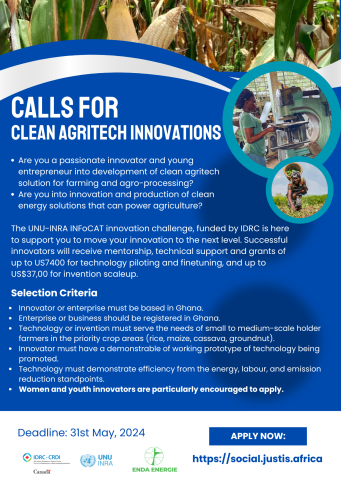PRESS RELEASE
UNU INRA Calls for Clean Energy Powered Agritech Innovations
Accra, Ghana; 9 May 2024 - The United Nations University, Institute for Natural Resources in Africa, is rolling out a call for its Innovate for Clean Agricultural Technologies (INFoCAT) project.
The INFoCAT innovation challenge is an initiative sponsored by IDRC under the Clean Energy for Development: A Call for Action programme and is partnered by Enda Energie and UNU INRA.
The INFoCAT innovation challenge is to support low-cost clean energy-powered agritech innovators, with the intention to expand access to reliable, affordable, and sustainable energy technologies for smallholder women and youth farmers in Ghana, Senegal and Cote D’Ivoire to increase agricultural productivity and income.
The objectives of the Innovation challenge are to:
• Support the development and expansion of affordable, labour-saving, clean energy agricultural technology solutions to save time and reduce drudgery.
•Support clean energy agriculture technology start-ups with a focus on women-led enterprises and where possible, refine and expand their products to meet the needs of smallholder rural farmers and
•Create avenues for mentorship, access to networking and training.

Eligibility & Criteria
Eligible innovators or enterprises must be based in Ghana.
Complete application form with business details and full description of the innovation.
Agritech technology must be powered by clean energy and must demonstrate energy efficiency.
Technology must meet the needs ofsmall to medium-scale holder rural farmers in the priority crop areas (rice, maize, cassava, and groundnut).
Technology use must require less human (manual) labour and time.
Technology must be cost-effective and have clear commercial potential, be easy to operate and scalable. Demonstrate a solution that reduces CO2 emissions.
Teamwork is highly recommended (including members with diverse backgrounds). The team must demonstrate gender intersectionality with inclusion of women. Priority will be given to women and youth innovators.
Clean energy supply - the innovation should have the potential to be used to power both agricultural technologies and other use. This will be an added advantage.
Demonstration of a working prototype (NB: There is room for new technology yet to be designed).
Pilot grant: USD 3,000 -7,400 (grant available for about 10 innovations/ teams/ enterprise) Business Scale-up grant support: USD 30,000 - 37,000 (1 innovation/team)
Priority Areas : The clean energy-powered agritech innovation must solve one or more of the priority challenges listed : Crop: Rice Groundnut Maize Cassava Challenge: Irrigation planting Paddy harvesting Threshing & Cleaning Hauling & bagging Issue of bird pests Harvesting Plucking pod Sorting groundnut bods Processing nuts Planting De-husking maize Dehuller Peeling Slicing Grating/ milling Dehydrating (drying) Sieving and Roasting
Deadline for applying is June 7, 2024.
Applicants should sign up and apply online at https://rb.gy/kg7bzw.
About UNU INRA: UNU-INRA is one of the 14 Research Institutes of the United Nations University (UNU). It aims to bridge the gap between science and natural resources management policies in Africa, with a mandate to strengthen African national institutions’ capacity to manage natural resources. Established in 1985, UNU-INRA is a leading voice in Africa’s natural resource knowledge base, contributing to research and evidence to bridge the gap between science and policy and promote sustainable development through natural resource governance that is sensitive to climate change.
END
